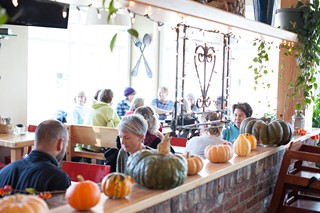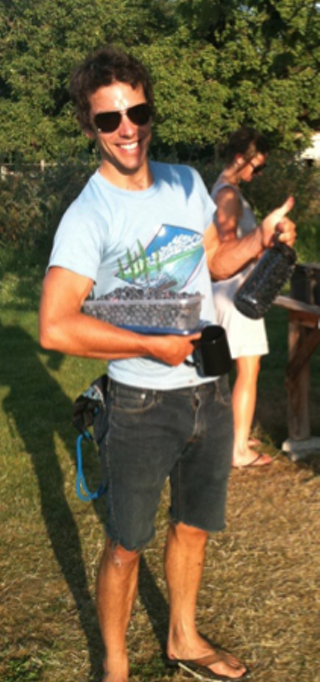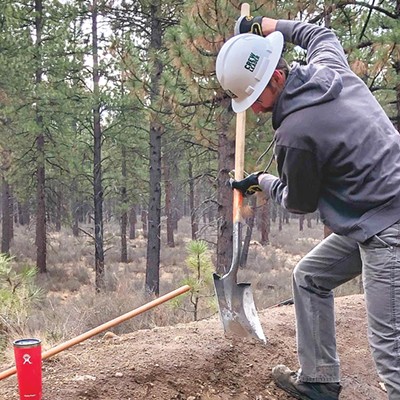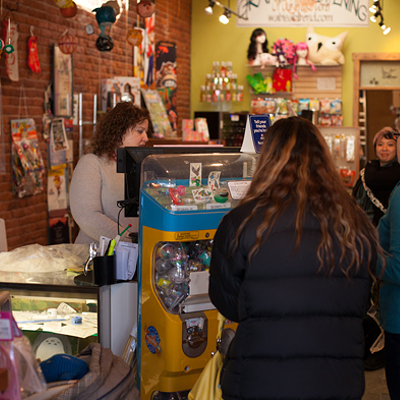People don't fit into tidy little boxes.
Take Bend's Kimberley Loveless, a mom who, along with her husband, Dan, recently opened an independent coffee shop on the east side of town. The café, Bend Coffee Connection, specializes in all things local, from the coffee beans to the baked goods. "Taste the local difference," a window sign invites. The meticulously decorated coffee shop, which maintains a very active Facebook page announcing daily deals and café updates, is an oasis from the abundant chain joints nearby (within just a few blocks, there are three Starbucks).
"When it comes to coffee, we like the mom and pop joints," explains a cheery Loveless. "We're just super into local."
Loveless, whom I just met, was relaying all this to me outside the front doors of an Olive Garden—the archetypical chain restaurant that, in my mind at least, is the epitome of bland mediocrity and out-of-town profits. It doesn't really fit in with Loveless' buy-local model, but there we all were. At an Olive Garden. Loveless and her teenage daughter had just finished off a dinner of soup and breadsticks (Zuppa Toscana, their favorite; a steal at $6.49 a bowl), a comforting and familiar meal they indulge in every so often.
"We like to try different places," Loveless says of her and her husband's dining preferences. "But my daughter is more into the tried and true."
They weren't the only soup-and-breadstick fans that night. Despite Bend's burgeoning independent food, coffee and beer scene, the Olive Garden's Cascade Village parking lot was packed on a recent cold and blustery Sunday evening.
It was right around 5:30 pm—prime dinner hour, especially for the family set—and a near constant stream of customers, young and old, filed in and out through the restaurant's glass-and-wood double doors. Inside the eatery, it is spacious, warm and inviting—and familiar to anyone who has ever sat in any other Olive Garden, or even seen one of its many TV ads. Smiling servers, dressed in classic black from head to toe, bustled in and out of the kitchen carrying overflowing plates of ziti and baskets of warm bread. But it all felt a little off; not intimate, and certainly not unique.
Increasingly, diners want to feel a connection to their food and drink (think: the oft-quoted chicken dinner "Portlandia" skit, in which two hipster diners not only want to know if the bird is local, but also its name and living conditions). So, why were locals choosing Olive Garden over any one of the dozens of impressive, well-considered, locally owned and operated Bend restaurants? Convenience, cost and familiarity, is what I was told by the many people I interviewed.
Surely, though, local eateries and grocers can compete—especially if quality is part of the conversation. With the holidays fast approaching—a time when family and friends gather over food and drink—and as shopping outings hit their annual peak, it is both worth gut-checking one's own eat-local habits, as well as considering the pros and cons of dining and buying local (The National Restaurant Association expects 33 million Americans will rely on restaurants for at least part of their Thanksgiving meal. Furthermore, 46 million Americans are expected to eat out while shopping on Thanksgiving or on Black Friday.)
While seated at a corner table of the popular westside restaurant he owns, Jay Junkin, along with general manager Aaron Christenson, lays out one of the biggest benefits of shopping local—reinvesting in the community.
"You're supporting the local ecosystem of Bend," he says, before explaining how the success of Jackson's Corner has allowed Junkin to open up a new eastside location. As soon as next fall (the expected opening), Junkin will have created another 35 local jobs. "Every single person is affected," he concludes.
As if on cue, Jim, a pleasant looking grey-haired gentleman, approaches the counter. Christenson explains that three times a week Jime delivers microgreens for the Bend company Tender Greens. His young shoots will be added to pasta and salad dishes—it's a small part of what makes the food at Jackson's so fresh—and so good—and it is also what helps keep Bend residents and business owners in the black.
According to Civic Economics, an Austin consulting firm, for every $100 spent at a locally owned store, $45 remains in the local economy, which is much better than the alternative—only $13 per $100 spent at big box stores and chains stays in the community. That kind of money adds up quickly, especially considering all the dollars spent at one of Bend's biggest draws—its 20-plus breweries. According to Oregon Business Magazine, the state's brewing industry contributes $2.25 billion annually to Oregon's economy. (Which is why, I argue, a bottle of Crux Fermentation Project's Tough Love Banished Imperial Stout may well make a better Christmas gift than another gift certificate to Amazon.com.)
Junkin and Christenson explain that by working with area organizations like Agricultural Connections (agriculturalconnections.com) and by supporting local farms like DD Ranch, Jackson's Corner is able to beef up the local economy while also offering a better product. While such efforts may go unnoticed by some, Bend's Diana Drew-Fleming eats them up—literally.
"For me, it's a no brainer," says Drew-Fleming, between bites of Jackson Corner's arugula salad and pulled pork sandwich. "We need to keep what's important about Bend alive." She then rattles off a list of
her favorite local establishments: Bend Furniture, 10 Barrel Brewing, Jackson's Corner, Primal Cuts Meat Market.
But what about a place like Starbucks? Not at all local, but, on the surface at least, the Seattle-based coffee enterprise seems to be doing everything right—offering enviable benefit packages to employees (even part-timers), sourcing responsibly grown and ethically traded beans, and building LEED certified stores. Recently, the global corporation has thrown around considerable weight and influence in the political sphere and come out in support of gay marriage while asking gun-toting patrons to go elsewhere. (For now, we'll overlook that the CEO's $16 million salary may not exactly smack of keeping-all-things-equal.)
Drew-Fleming says that all those great efforts aside, a mammoth company like Starbucks can't compete with the intimate feel of a local café.
"It's an exciting experience, going somewhere local." Plus, Drew-Fleming adds, Starbucks "can't make a pour-over coffee like Thump."
























